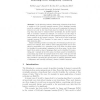Free Online Productivity Tools
i2Speak
i2Symbol
i2OCR
iTex2Img
iWeb2Print
iWeb2Shot
i2Type
iPdf2Split
iPdf2Merge
i2Bopomofo
i2Arabic
i2Style
i2Image
i2PDF
iLatex2Rtf
Sci2ools
117
click to vote
ALT
2008
Springer
2008
Springer
Learning with Temporary Memory
In the inductive inference framework of learning in the limit, a variation of the bounded example memory (Bem) language learning model is considered. Intuitively, the new model constrains the learner’s memory not only in how much data may be retained, but also in how long that data may be retained. More specifically, the model requires that, if a learner commits an example x to memory in some stage of the learning process, then there is some subsequent stage for which x no longer appears in the learner’s memory. This model is called temporary example memory (Tem) learning. In some sense, it captures the idea that memories fade. Many interesting results concerning the Tem-learning model are presented. For example, there exists a class of languages that can be identified by memorizing k + 1 examples in the Tem sense, but that cannot be identified by memorizing k examples in the Bem sense. On the other hand, there exists a class of languages that can be identified by memorizing ju...
Related Content
| Added | 14 Mar 2010 |
| Updated | 14 Mar 2010 |
| Type | Conference |
| Year | 2008 |
| Where | ALT |
| Authors | Steffen Lange, Samuel E. Moelius, Sandra Zilles |
Comments (0)

